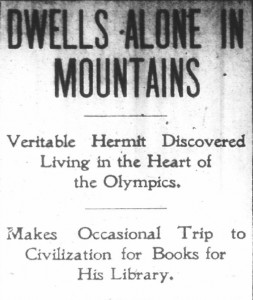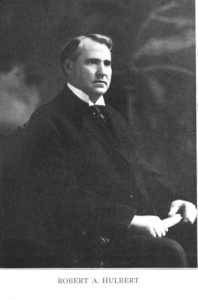“Veritable Hermit Discovered Living in the Heart of the Olympics”
From the desk of Steve Willis, Central Library Services Program Manager of the Washington State Library.
The following article was found at random in the Sept. 1, 1903 issue of the Seattle Daily Times and contains a description of one of the more unusual libraries in Washington State history:
 The Times Special Service.
The Times Special Service.
EVERETT, Tuesdays, Sept. 1.–A hermit, such as fiction deals in, has been discovered in the heart of the Olympic mountains, by Attorney Robert A. Hulbert, of this city, who has returned from a fishing trip through that rugged region.
The hermit, who, years ago, was known in New York City by the name of Le Barr, lives in a commodious cabin, high up in the foothills and fourteen miles from others of his race. The account of his brief visit with the recluse is told as follows by Attorney Hulbert.
“Hermit Le Barr is 60 years of age. Fourteen years ago, after domestic troubles, he left his family in New York City and turned to the West, a wanderer on the face of the earth, with no place he could call his home.
“Thinking to find gold he went into the Olympic mountains prospecting. Almost before he knew it his supply of provisions became exhausted. Starvation stared him in the face and he turned his tottering steps toward civilization.
“His hunger became intense, and at the time he had about resigned himself to his fate he managed to shoot a large trout. This he baked upon the rocks and consumed ravenously.
“As he completed his meal an elk strayed across the trail and a shot from his rifle brought the magnificent animal to earth. The following morning he killed a large bear.
Had Found Paradise.
“Le Barr told me he immediately made up his mind that he had reached paradise, and straightaway built a roomy cabin, hewing the logs and riving the planks with his own hands.
“The hermits next step was to take up a claim of 160 acres. This valuable timber land is now in the very heart of a government reservation. The United States recognizes Le Barr’s ownership, and the old man looks forward to a time when Uncle Sam shall pay him a handsome sum of money to relinquish his claim.
“The cabin in the wilderness is composed of a single room 20 by 40 feet. Trophies of his skill with the rifle adorn the rought-hewn walls. He has learned taxidermy and has many fine heads of deer, bear, elk and smaller denizens of the forest scattered about in decorative disorder. Deep and soft are the skins of wild animals covering the floor– a collection of years.
The Hermit’s Library.
“An incongruity striking my attention was the presence of many late books and magazines carefully placed in rough bookcases.
“Frequently Hermit Le Barr walks sixteen miles to replenish his library. He is well read and remarkably well posted on current events.
“When bleak winter makes his approach, the hermit lays in a great supply of wood and goes on long hunting excursions to stock his larder. And then the snow comes, sometimes ten feet, frequently thirty-five feet covers his cabin, and he and his books and dogs are prisoners for three long months.
“The hermit is a picture. His frame is tall, his hair falls long on his shoulders and his great beard drops nearly to his waist. He is clad in buckskin from head to foot.
“Le Barr says he frequently sees great herds of elk roaming the hills and valleys. Before government rangers were placed in the timber Le Barr told me that whites and Indians killed entire herds as the animals wallowed in deep snow.”
Rufus Lebar (sometimes called Labaie, or Le Barr) was born ca. 1836 in Pennsylvania to French immigrant parents and was raised in Connecticut. He served in the Union Army for most of the Civil War as a soldier in an artillery unit. Rufus appears to have built his cabin about 1890. It sat deep in the woods, 15 miles west of Hoodsport, at an elevation of 850 ft.
In History of Hoodsport / by Jean L. Bearden, the story continues: “Rufus LeBarr had taken a homestead claim on the South Fork of the Skokomish which he had filed in 1890. In 1905, he was still waiting for the government to give him title to the land. The surveys were still disputed and finally, after he was ready to give up, he was given the title in 1906, sixteen years after he had applied.”
Rufus promptly sold the land in 1907. Today his homestead is now part of a trail along the lower south fork of the Skokomish River in Olympic National Forest. Rufus died Oct. 25, 1909 at the home of his daughter in Seattle.
 Robert Ansel Hulbert, the attorney who told the tale, was born in Seattle on Mar. 10, 1864. After obtaining a law degree from the University of Washington in the 1880s he served as Snohomish County Clerk in the 1890s and then worked in private practice in Everett until 1907, when he moved to Seattle. Hulbert died in Seattle Dec. 30, 1943.
Robert Ansel Hulbert, the attorney who told the tale, was born in Seattle on Mar. 10, 1864. After obtaining a law degree from the University of Washington in the 1880s he served as Snohomish County Clerk in the 1890s and then worked in private practice in Everett until 1907, when he moved to Seattle. Hulbert died in Seattle Dec. 30, 1943.
And the fate of Lebar’s library has escaped the pages of history.